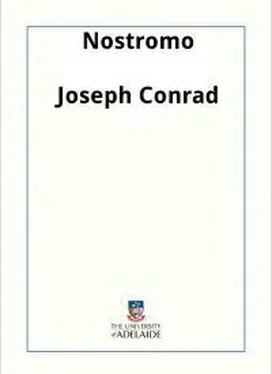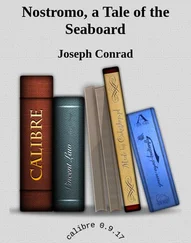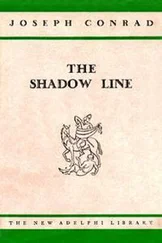Джозеф Конрад - Nostromo - A Tale of the Seaboard
Здесь есть возможность читать онлайн «Джозеф Конрад - Nostromo - A Tale of the Seaboard» весь текст электронной книги совершенно бесплатно (целиком полную версию без сокращений). В некоторых случаях можно слушать аудио, скачать через торрент в формате fb2 и присутствует краткое содержание. Год выпуска: 2006, Жанр: Классическая проза, на английском языке. Описание произведения, (предисловие) а так же отзывы посетителей доступны на портале библиотеки ЛибКат.
- Название:Nostromo: A Tale of the Seaboard
- Автор:
- Жанр:
- Год:2006
- ISBN:нет данных
- Рейтинг книги:4 / 5. Голосов: 1
-
Избранное:Добавить в избранное
- Отзывы:
-
Ваша оценка:
- 80
- 1
- 2
- 3
- 4
- 5
Nostromo: A Tale of the Seaboard: краткое содержание, описание и аннотация
Предлагаем к чтению аннотацию, описание, краткое содержание или предисловие (зависит от того, что написал сам автор книги «Nostromo: A Tale of the Seaboard»). Если вы не нашли необходимую информацию о книге — напишите в комментариях, мы постараемся отыскать её.
Nostromo: A Tale of the Seaboard — читать онлайн бесплатно полную книгу (весь текст) целиком
Ниже представлен текст книги, разбитый по страницам. Система сохранения места последней прочитанной страницы, позволяет с удобством читать онлайн бесплатно книгу «Nostromo: A Tale of the Seaboard», без необходимости каждый раз заново искать на чём Вы остановились. Поставьте закладку, и сможете в любой момент перейти на страницу, на которой закончили чтение.
Интервал:
Закладка:
Mrs Gould watched his abstraction with dread. It was a domestic and frightful phenomenon that darkened and chilled the house for her like a thundercloud passing over the sun. Charles Gould’s fits of abstraction depicted the energetic concentration of a will haunted by a fixed idea. A man haunted by a fixed idea is insane. He is dangerous even if that idea is an idea of justice; for may he not bring the heaven down pitilessly upon a loved head? The eyes of Mrs. Gould, watching her husband’s profile, filled with tears again. And again she seemed to see the despair of the unfortunate Antonia.
“What would I have done if Charley had been drowned while we were engaged?” she exclaimed, mentally, with horror. Her heart turned to ice, while her cheeks flamed up as if scorched by the blaze of a funeral pyre consuming all her earthly affections. The tears burst out of her eyes.
“Antonia will kill herself!” she cried out.
This cry fell into the silence of the room with strangely little effect. Only the doctor, crumbling up a piece of bread, with his head inclined on one side, raised his face, and the few long hairs sticking out of his shaggy eyebrows stirred in a slight frown. Dr. Monygham thought quite sincerely that Decoud was a singularly unworthy object for any woman’s affection. Then he lowered his head again, with a curl of his lip, and his heart full of tender admiration for Mrs. Gould.
“She thinks of that girl,” he said to himself; “she thinks of the Viola children; she thinks of me; of the wounded; of the miners; she always thinks of everybody who is poor and miserable! But what will she do if Charles gets the worst of it in this infernal scrimmage those confounded Avellanos have drawn him into? No one seems to be thinking of her.”
Charles Gould, staring at the wall, pursued his reflections subtly.
“I shall write to Holroyd that the San Tome mine is big enough to take in hand the making of a new State. It’ll please him. It’ll reconcile him to the risk.”
But was Barrios really available? Perhaps. But he was inaccessible. To send off a boat to Cayta was no longer possible, since Sotillo was master of the harbour, and had a steamer at his disposal. And now, with all the democrats in the province up, and every Campo township in a state of disturbance, where could he find a man who would make his way successfully overland to Cayta with a message, a ten days’ ride at least; a man of courage and resolution, who would avoid arrest or murder, and if arrested would faithfully eat the paper? The Capataz de Cargadores would have been just such a man. But the Capataz of the Cargadores was no more.
And Charles Gould, withdrawing his eyes from the wall, said gently, “That Hirsch! What an extraordinary thing! Saved himself by clinging to the anchor, did he? I had no idea that he was still in Sulaco. I thought he had gone back overland to Esmeralda more than a week ago. He came here once to talk to me about his hide business and some other things. I made it clear to him that nothing could be done.”
“He was afraid to start back on account of Hernandez being about,” remarked the doctor.
“And but for him we might not have known anything of what has happened,” marvelled Charles Gould.
Mrs. Gould cried out—
“Antonia must not know! She must not be told. Not now.”
“Nobody’s likely to carry the news,” remarked the doctor. “It’s no one’s interest. Moreover, the people here are afraid of Hernandez as if he were the devil.” He turned to Charles Gould. “It’s even awkward, because if you wanted to communicate with the refugees you could find no messenger. When Hernandez was ranging hundreds of miles away from here the Sulaco populace used to shudder at the tales of him roasting his prisoners alive.”
“Yes,” murmured Charles Gould; “Captain Mitchell’s Capataz was the only man in the town who had seen Hernandez eye to eye. Father Corbelan employed him. He opened the communications first. It is a pity that—”
His voice was covered by the booming of the great bell of the cathedral. Three single strokes, one after another, burst out explosively, dying away in deep and mellow vibrations. And then all the bells in the tower of every church, convent, or chapel in town, even those that had remained shut up for years, pealed out together with a crash. In this furious flood of metallic uproar there was a power of suggesting images of strife and violence which blanched Mrs. Gould’s cheek. Basilio, who had been waiting at table, shrinking within himself, clung to the sideboard with chattering teeth. It was impossible to hear yourself speak.
“Shut these windows!” Charles Gould yelled at him, angrily. All the other servants, terrified at what they took for the signal of a general massacre, had rushed upstairs, tumbling over each other, men and women, the obscure and generally invisible population of the ground floor on the four sides of the patio. The women, screaming “Misericordia!” ran right into the room, and, falling on their knees against the walls, began to cross themselves convulsively. The staring heads of men blocked the doorway in an instant—mozos from the stable, gardeners, nondescript helpers living on the crumbs of the munificent house—and Charles Gould beheld all the extent of his domestic establishment, even to the gatekeeper. This was a half-paralyzed old man, whose long white locks fell down to his shoulders: an heirloom taken up by Charles Gould’s familial piety. He could remember Henry Gould, an Englishman and a Costaguanero of the second generation, chief of the Sulaco province; he had been his personal mozo years and years ago in peace and war; had been allowed to attend his master in prison; had, on the fatal morning, followed the firing squad; and, peeping from behind one of the cypresses growing along the wall of the Franciscan Convent, had seen, with his eyes starting out of his head, Don Enrique throw up his hands and fall with his face in the dust. Charles Gould noted particularly the big patriarchal head of that witness in the rear of the other servants. But he was surprised to see a shrivelled old hag or two, of whose existence within the walls of his house he had not been aware. They must have been the mothers, or even the grandmothers of some of his people. There were a few children, too, more or less naked, crying and clinging to the legs of their elders. He had never before noticed any sign of a child in his patio. Even Leonarda, the camerista, came in a fright, pushing through, with her spoiled, pouting face of a favourite maid, leading the Viola girls by the hand. The crockery rattled on table and sideboard, and the whole house seemed to sway in the deafening wave of sound.
CHAPTER FIVE
During the night the expectant populace had taken possession of all the belfries in the town in order to welcome Pedrito Montero, who was making his entry after having slept the night in Rincon. And first came straggling in through the land gate the armed mob of all colours, complexions, types, and states of raggedness, calling themselves the Sulaco National Guard, and commanded by Senor Gamacho. Through the middle of the street streamed, like a torrent of rubbish, a mass of straw hats, ponchos, gun-barrels, with an enormous green and yellow flag flapping in their midst, in a cloud of dust, to the furious beating of drums. The spectators recoiled against the walls of the houses shouting their Vivas! Behind the rabble could be seen the lances of the cavalry, the “army” of Pedro Montero. He advanced between Senores Fuentes and Gamacho at the head of his llaneros, who had accomplished the feat of crossing the Paramos of the Higuerota in a snow-storm. They rode four abreast, mounted on confiscated Campo horses, clad in the heterogeneous stock of roadside stores they had looted hurriedly in their rapid ride through the northern part of the province; for Pedro Montero had been in a great hurry to occupy Sulaco. The handkerchiefs knotted loosely around their bare throats were glaringly new, and all the right sleeves of their cotton shirts had been cut off close to the shoulder for greater freedom in throwing the lazo. Emaciated greybeards rode by the side of lean dark youths, marked by all the hardships of campaigning, with strips of raw beef twined round the crowns of their hats, and huge iron spurs fastened to their naked heels. Those that in the passes of the mountain had lost their lances had provided themselves with the goads used by the Campo cattlemen: slender shafts of palm fully ten feet long, with a lot of loose rings jingling under the ironshod point. They were armed with knives and revolvers. A haggard fearlessness characterized the expression of all these sun-blacked countenances; they glared down haughtily with their scorched eyes at the crowd, or, blinking upwards insolently, pointed out to each other some particular head amongst the women at the windows. When they had ridden into the Plaza and caught sight of the equestrian statue of the King dazzlingly white in the sunshine, towering enormous and motionless above the surges of the crowd, with its eternal gesture of saluting, a murmur of surprise ran through their ranks. “What is that saint in the big hat?” they asked each other.
Читать дальшеИнтервал:
Закладка:
Похожие книги на «Nostromo: A Tale of the Seaboard»
Представляем Вашему вниманию похожие книги на «Nostromo: A Tale of the Seaboard» списком для выбора. Мы отобрали схожую по названию и смыслу литературу в надежде предоставить читателям больше вариантов отыскать новые, интересные, ещё непрочитанные произведения.
Обсуждение, отзывы о книге «Nostromo: A Tale of the Seaboard» и просто собственные мнения читателей. Оставьте ваши комментарии, напишите, что Вы думаете о произведении, его смысле или главных героях. Укажите что конкретно понравилось, а что нет, и почему Вы так считаете.












